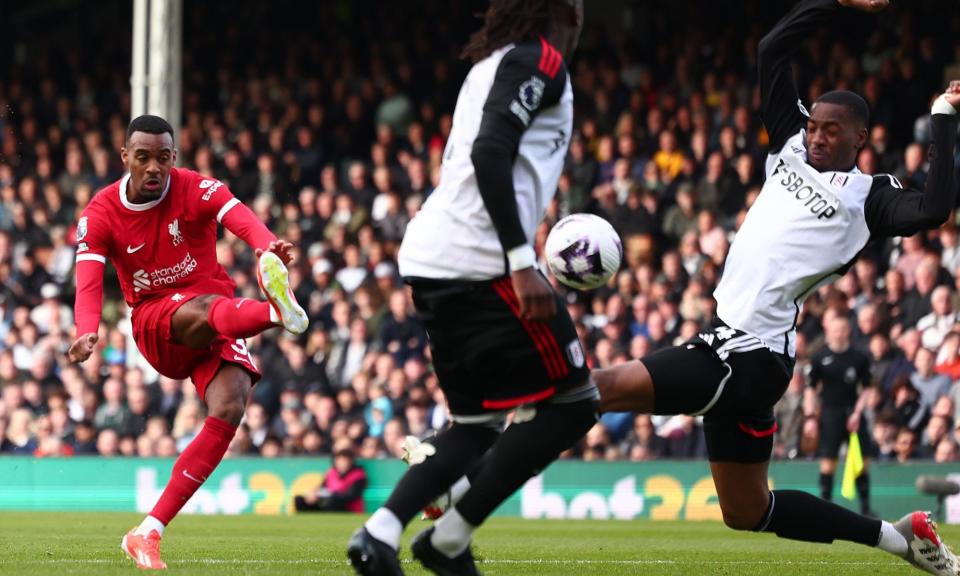Ryan Gravenberch tries to make his case for Jürgen Klopp’s final games

Travelling across London for this game the trains seemed full of exhausted‑looking people carrying a medal and a slight limp. Liverpool’s own marathon approaches what they hope will be a similarly rewarded conclusion with only the tiredness guaranteed. They took another weary step towards a potentially positive outcome here, hauling themselves back to parity on points with Arsenal at the top of the table. It was the result they needed, with the team they had to play, and that was enough.
With a nearly fit squad Jürgen Klopp said after the game that “the situation at the moment is as good as it has been all season”, superstitiously banging a table as he did so. It was not just the manager touching wood: he used the flexibility all those fit footballers afforded him to pack his bench with superstars: of the 10 players with the most minutes for Liverpool this season in all competitions seven were among the substitutes. “I hate thinking about the game after the one in front of us,” Klopp said, but with three away fixtures in a week and the second of those at Everton on Wednesday his hand was forced. “We made these changes,” he said, “because we were 100% convinced we had to.”
Related: Premier League weekend awards: Trent Alexander-Arnold returns in style
Some players will be looking forward to the end of the season more than others, and in some cases tiredness will not be a factor in this feeling. Ryan Gravenberch is 19th on the list of the players Klopp has called upon most across this campaign – in all this was just the sixth time the Dutchman has played as many as 70 minutes: three times now against Fulham, and three against everyone else. But for all that his goal was key in guiding Liverpool to victory he could not truly grasp this latest chance to demonstrate his suitability for a role in the German’s midfield. He has already been linked with a summer move away from Anfield, but if he is to stay perhaps he will feel a measure of relief that Klopp has only five more midfields to pick.
This was a hard one for Gravenberch to shine in, with Wataru Endo’s role at the base of the triangle so clearly defined and Harvey Elliott’s on the right so loosely. The Dutchman floated around his left side of central midfield while notionally alongside him his fellow 21-year-old scampered constantly, on the right-wing one minute, offering support on the left the next, before dropping back to cover for one of Trent Alexander-Arnold’s excursions. Gravenberch has an unusual ability to appear still even when in motion, which while impressive in its way only emphasised the contrast with Elliott’s constant, frantic and very obvious action.
Even so it is easy to see why Liverpool considered him worth the £34.3m that brought him to the club last summer. He is the kind of player who makes the game seem effortless, crowbarred uncomfortably, if only occasionally, into a side that demands extraordinary effort. There are teams, perhaps even this one on occasions, in which the bubble of complete calm that Gravenberch tends to inhabit would be more appreciated, but here he often seemed a spectator as his teammates bustled around him. When key moments were replayed he was often to be found on the fringes of the screen, slightly out of focus. Fulham’s equaliser was a case in point: he was one of two Liverpool players who found themselves just a couple of yards away as the ball ran to Timothy Castagne. The other, Andy Robertson, threw himself forwards in an effort to get in the way and beat the turf in frustration when it proved futile; Gravenberch remained a couple of yards away, watching him do it.
They often seemed to be playing completely different games, but there were a couple of occasions when Elliott and Gravenberch combined convincingly. One was in the 53rd minute, when the Englishman cut off Alex Iwobi’s attempted crossfield pass and found his teammate in space on the edge of the D; the other was the complicated celebratory handshake routine that followed a few seconds later. With no defender on hand to pierce his bubble, Gravenberch turned before stroking a deliciously unhurried shot into the corner of the net, his first league goal for the club. He is young, and there is talent there, but perhaps Klopp, for all his genius, is not the man to find it.
Alexander-Arnold’s, meanwhile, is irresistible. It may be that in the early stages here a couple of his trademark crossfield passes were picked off by Fulham defenders – thereafter it was not so much that his accuracy improved as that he stopped trying – but for the 80 minutes he was on the pitch, the most he has played in more than four months, he, like the free-kick with which he opened the scoring, was exceptional. Beside the river, Trent flowed. Liverpool’s title challenge, unlike all those knackered athletes, is still up and running.

